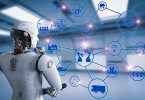We know we’re living in an increasingly data-driven world, but have you ever wondered what all that data says about us? Dr. Tricia Wang has, and BMC CTO Ram Chakravarti and AWS Senior Partner Development Manager Vijaya Balakrishna were honored to recently host a new Transformational Speaker webinar with the global tech ethnographer, researcher, and popular TED Talk speaker to get her take on “thick data”—the human element invisible to quantitative data analysis. Here are some highlights of the conversation.
Looking beyond the qualitative
Dr. Wang kicked off the discussion explaining that what’s most interesting to her is going beyond the basic definition that most people think of when they use the term “data.” “We all know what big data is. It’s numbers that are put in spreadsheets that are put in data lakes, data warehouses, all that stuff…that you can then do math on. But the world is not just numbers. There are other ways to represent the world and to represent the…processes that we’re interested in, especially that businesses are interested in,” she explains.
“If you think about in your everyday life, you don’t make decisions just based on numbers. We make decisions based on a holistic picture, and so numbers are taken into account, [but] you’re also looking at non-quantitative indicators.” She points to people’s reliance on smart watches and Fitbits as monitoring tools while still paying attention to general indicators such as how they actually feel.
She explains that it’s been her life’s work educating business leaders who want to stay ahead on how to yield value from non-quantitative data and leverage it as an indicator to drive actionable insights and make their businesses more agile and customer centric. And she says that while automation is gaining prominence, it’s not the only tool that you should have in your toolbox.
“Any qualified, legit business leader is fully aware that you need to have domain expertise and that domain expertise holds so much thick data,” she says. “There’s so much thick data that’s required to manage relationships…to read[ing] a room [and] knowing how to present a story to get buy in. The higher you go up, you’re really just…trying to convince people to see your point of view and get to some aligned outcome. And that requires thick data. You can’t just convince people based on quantitative numbers.”
“You need to have a human in the loop and really understand the human model, or the landscape that you are trying to understand, [or] the business outcomes. And then you can look at the variables that are going to help you understand that human model [and] build your data model based on the human model.” She adds that she tells her CEOs to stop treating their CIOs and CTOs like technical partners and help them understand their role as cultural change agents for the entire business.
Data in a brave new world
Dr. Wang turned the discussion toward the pandemic, highlighting that it’s had a significant impact not just on people in their personal and professional lives, but businesses, too. “Business ethnography now is about observing customers, their needs and motivations, in their own environment, in their own cultural setting. The whole world has changed and it’s still changing. We live in an incredible time where we talk about digital transformation and businesses leading digital transformation. The reality is front facing digital transformation was not what…it wasn’t really until the pandemic really forced the whole world online,” she says.
“One of the biggest changes is what I call the spatial collapse, where before, for centuries, since the Industrial Revolution, we lived in a way that has been more or less separated by three spaces. Home is the first space, the second space is the workspace, and then the third space is everything you do outside of that, from having fun, seeing strangers, meeting with your friends. And what the pandemic did was collapse all the three spaces into one. That is one of the biggest trends for changing customer behavior and the psychology of it.”
“The mental models of how they build their lives has radically changed. And it doesn’t just mean it’s customer behavioral change. It means employees change. The way we recruit talent changes. People have different expectations when there’s a spatial collapse.” She points out that’s why so many employees bristled at return to office mandates.
A new (siloed) world view
Dr. Wang also points out that in addition to the pandemic, sociopolitical and geopolitical events like the global supply chain shortage and the war in Ukraine have all had ripple effects from “how someone is staying warm over the night, and how they’re getting food” because we are in “a very interconnected world.” And while that connectedness holds true for the real world, people are shifting more toward silos online, which in turn is disrupting how digital business finds its customers.
“We’re going to see more polarization. I’m not anti-social media, but I do think [its] algorithms have been optimized for moving people into polarization and two extreme ends. Having safe spaces for conversation becomes much harder…which means that a lot of people are moving off social media, off of public spaces, into smaller walled gardens like private conversation groups like WhatsApp or Signal,” she explains.
“What this means for businesses, in this era, [is] that you have to do a better job on getting to know your customer. First-party data becomes even more valuable. However, customers or…people are much more aware of the value of their personal data to a [billion-dollar] market, and people want a piece of that. [It] requires trusting relationships [and] the business has to change the way they collect data and communicate data…and show transparently what [they’re] doing with that data.”
A shifting focus
Another effect of the pandemic is that people moved to new cities and towns—and reexamined how they live, elevating larger discussions around environmental, social, and governance (ESG); corporate social responsibility (CSR); and sustainability. People now want much more transparency from businesses about how they are going to influence their lives, contribute to the world overall, and make it a better place—and they’re redefining what “better” means.
“One of the things we’re seeing is the change in supply chain strategy, because people are saying, ‘more local.’ (…) They have a new kind of relationship with those around them, the city or the space around them, and their shops are connected to their local economies in different ways. There’s a lot happening around regionalization of supply chains to keep things more stable. People are much more aware of a disruptive supply chain and really thinking through, ‘ ‘Where does my food come from?’ ‘What does my clothing come from?’ ‘What kind of stores or businesses am I supporting?’ Big topic issues that maybe weren’t as top of mind, like the climate and food security, will become even more important.”
As Dr. Wang shared, the concept of data is far-reaching, and automation can help you get a handle on it and yield its maximum value. To learn more about automating your entire big data lifecycle from end to end—and cloud to cloud—to deliver insights more quickly, easily, and reliably, download our e-book.





